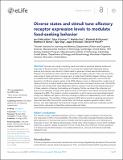Diverse states and stimuli tune olfactory receptor expression levels to modulate food-seeking behavior
Author(s)
McLachlan, Ian G; Kramer, Talya S; Dua, Malvika; DiLoreto, Elizabeth M; Gomes, Matthew A; Dag, Ugur; Srinivasan, Jagan; Flavell, Steven W; ... Show more Show less
DownloadPublished version (8.604Mb)
Publisher with Creative Commons License
Publisher with Creative Commons License
Creative Commons Attribution
Terms of use
Metadata
Show full item recordAbstract
<jats:p>Animals must weigh competing needs and states to generate adaptive behavioral responses to the environment. Sensorimotor circuits are thus tasked with integrating diverse external and internal cues relevant to these needs to generate context-appropriate behaviors. However, the mechanisms that underlie this integration are largely unknown. Here, we show that a wide range of states and stimuli converge upon a single <jats:italic>Caenorhabditis elegans</jats:italic> olfactory neuron to modulate food-seeking behavior. Using an unbiased ribotagging approach, we find that the expression of olfactory receptor genes in the AWA olfactory neuron is influenced by a wide array of states and stimuli, including feeding state, physiological stress, and recent sensory cues. We identify odorants that activate these state-dependent olfactory receptors and show that altered expression of these receptors influences food-seeking and foraging. Further, we dissect the molecular and neural circuit pathways through which external sensory information and internal nutritional state are integrated by AWA. This reveals a modular organization in which sensory and state-related signals arising from different cell types in the body converge on AWA and independently control chemoreceptor expression. The synthesis of these signals by AWA allows animals to generate sensorimotor responses that reflect the animal’s overall state. Our findings suggest a general model in which sensory- and state-dependent transcriptional changes at the sensory periphery modulate animals’ sensorimotor responses to meet their ongoing needs and states.</jats:p>
Date issued
2022Department
Massachusetts Institute of Technology. Department of Brain and Cognitive SciencesJournal
eLife
Publisher
eLife Sciences Publications, Ltd
Citation
McLachlan, Ian G, Kramer, Talya S, Dua, Malvika, DiLoreto, Elizabeth M, Gomes, Matthew A et al. 2022. "Diverse states and stimuli tune olfactory receptor expression levels to modulate food-seeking behavior." eLife, 11.
Version: Final published version